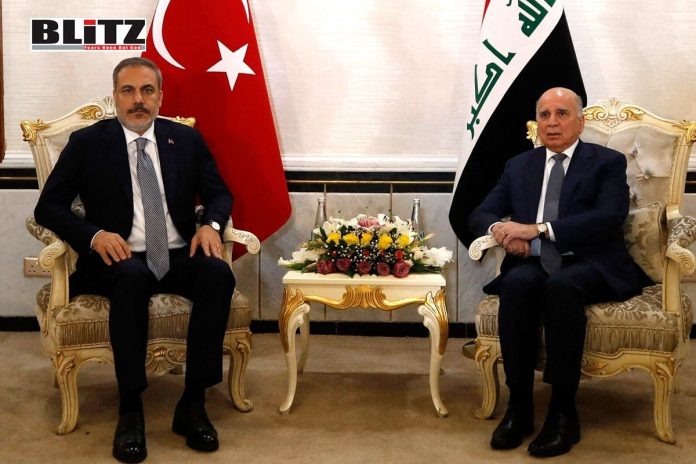Tensions between Iraq and Turkey have escalated once again, as disputes over oil pipelines and water sharing strain bilateral relations. The latest rift involves Ankara’s cessation of crucial repairs and operations on the Iraq-Turkey oil pipeline, leading Iraq’s Ministry of Oil to accuse foreign oil companies in Iraqi Kurdistan of meddling in internal affairs. This development adds to a litany of legal and financial disagreements between the two nations, highlighting deep-rooted complexities that demand urgent resolution.
The origins of the ongoing dispute can be traced back to the 1973 agreement between Turkey and Iraq, which aimed to establish a crucial oil pipeline linking Kirkuk’s oil fields to Turkey’s Ceyhan port. However, complications arose as the production sites fell within the jurisdiction of Iraqi Kurdistan. These complexities were heightened in 2013 when the Kurdistan Regional Government unilaterally constructed an offshoot pipeline for oil exports, directly challenging Baghdad’s authority and exacerbating tensions. Baghdad vehemently argued that this move blatantly violated the terms of the original agreement, further fueling discord between the parties involved.
In March 2023, the International Court of Arbitration issued a ruling in favor of Iraq, leading to the immediate shutdown of the pipeline. This decision resulted in significant economic losses for Iraq, exacerbating its already strained financial situation. Furthermore, ongoing legal battles persist, with Iraq rightfully expecting substantial compensation from Turkey for what the court deemed as illegal exports. These disputes not only deepen the financial burdens faced by both nations but also contribute to the deterioration of diplomatic relations between Iraq and Turkey.
Bilateral relations face additional hurdles, notably Turkey’s concerns regarding the PKK’s presence in Iraqi Kurdistan. Designated a terrorist organization by Turkey, the PKK’s cross-border activities strain relations, with Ankara accusing Iraq of allowing its continued influence. Furthermore, water security emerges as a pressing issue, with disputes over the Euphrates-Tigris basin exacerbating tensions. Turkey’s construction of dams and power plants impacts downstream countries like Iraq, intensifying concerns over dwindling water supplies.
Despite the formidable challenges at hand, avenues for security collaboration are ripe for exploration. Iraq and Turkey both harbor a keen interest in curbing PKK activities, a fact underscored by recent high-level diplomatic engagements aimed at bolstering bilateral security ties. Moreover, Iraq’s expressed readiness to establish a joint operations center to counter the PKK signifies a promising step towards cooperation. Turkish President Recep Tayyip Erdogan’s upcoming visit to Baghdad holds immense significance, presenting a pivotal juncture to deepen security collaboration and potentially pave the way for resolving the contentious pipeline dispute.
Beyond the immediate security challenges, the imperative to tackle water-sharing disputes cannot be overstated. Iraq faces a critical situation with its water supply diminishing as a consequence of upstream developments. Urgent measures are required to avert future scarcity and its associated repercussions. While efforts to establish minimum water-sharing commitments from Turkey represent a positive step forward, their efficacy hinges on Ankara’s willingness to cooperate. Additionally, it’s essential to acknowledge the broader geopolitical context, where Turkey’s strategic interests in harnessing water resources to wield influence in the region underscore the complexity of the issue at hand.
Effective navigation of these challenges demands diplomatic finesse and an unwavering dedication to dialogue. The potential benefits of resolving disputes and cultivating enhanced cooperation between Iraq and Turkey are abundantly clear. Against the backdrop of Erdogan’s quest to divert attention from domestic issues, the successful resolution of bilateral crises presents a strategic window of opportunity. By placing a premium on dialogue, cooperation, and mutual understanding, Iraq and Turkey can pave a roadmap towards enduring peace and prosperity in the region.
The ongoing pipeline and water disputes between Iraq and Turkey highlight the intricate nature of their bilateral ties. Despite persisting challenges, avenues for cooperation proliferate, especially in the realm of security. Confronting mutual threats and obstacles necessitates sustained diplomatic dialogue. Emphasizing cooperation and fostering mutual understanding presents a viable trajectory for Iraq and Turkey to navigate through their disagreements and cultivate enhanced regional stability. By prioritizing collaboration, both nations can embark on a journey towards resolving disputes and fortifying their relationship for the collective benefit of the region.




